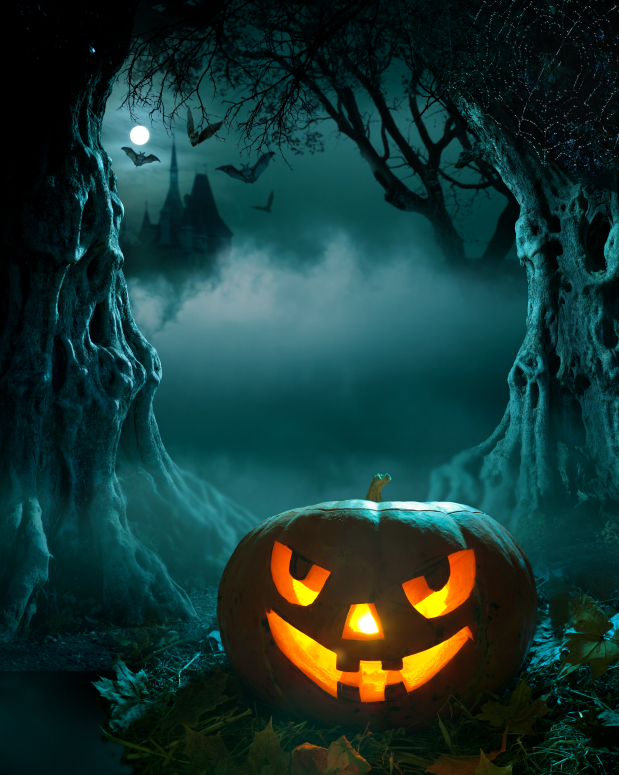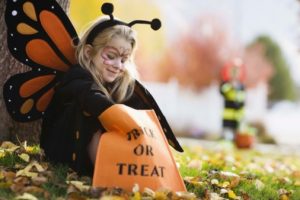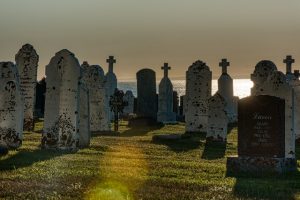 Another Halloween, another round of questions about its origins and whether or not we should let our children participate.
Another Halloween, another round of questions about its origins and whether or not we should let our children participate.The sad thing about this holiday is how it obscures the far more important Feast of All Saints, which occurs on November 1, and it’s been doing so for centuries, so much so that many people actually believe that the Feast of All Saints was derived from paganism. However, history reveals that the feast of All Hallow’s Eve, All Saints and the feast of All Souls evolved in the life of the Church independently of paganism and today’s version of Halloween.
The Feast of All Saints began in the 4th century. It was established by the early Christians to commemorate the martyrs who gave their lives for the faith during those first bloody centuries of Church history. Originally, it was celebrated on May 13, but it was changed to November 1 in the 9th century by Pope Gregory IV.
Now here’s where the connection to Halloween comes in.
November 1st is the same day that pagans used to mark the celebration of Samhain, which was the beginning of the Celtic winter. Samhain was the Celtic lord of death, and his name literally meant ‘summer’s end’. Since winter is the season of cold, darkness and death, the Celts soon made the connection with human death. The eve of Samhain, Oct. 31, was a time of Celtic pagan sacrifice, and when Samhain allowed the souls of the dead to return to their earthly homes for an evening. Ghosts, witches, goblins, and elves came to harm the people, particularly those who had inflicted harm on them in this life.
In order to protect themselves, people would extinguish their hearth fires and the Druids (who were priests and spiritual teachers) built a huge bonfire of sacred oak branches and would offer burnt sacrifices of crops, animals, and even humans. They would then tell fortunes for the coming year based on an examination of the burnt remains. People would sometimes wear costumes of animal heads and skins to these events.
The Celts weren’t the only group to contribute customs to what is now known as Halloween. In Ireland, people held a parade in honor of a god known as Muck Olla and would beg for food along the way. The Irish also created the legend of the jack-o-lantern which is a story about a man named Jack who was forbidden to enter heaven because of his stinginess, and could not enter hell because he played practical jokes on the devil. He was thus condemned to walk the earth with a lantern carved out of a pumpkin until Judgment Day.
The Roman conquest of Britain in AD 43 brought two more feasts into late October that still influence today’s celebration of Halloween. One was the feast of Feralia which was held in October to honor the dead and the other was an Autumn festival in honor of Pomona, the goddess of fruit and trees, which some believe is responsible for the association of apples with Halloween.
In spite of the fact that Christianity had spread throughout the world, many cultures maintained some of these traditions, which is what set the stage for the collision between the Feast of All Saints and that of All Hallows Eve or Halloween.
Instead of observing the Christian custom of remembering deceased loved ones in a special way on All Saints Day, the culture exploited elements of pagan rituals and practices, creating the pseudo-holiday that is today's Halloween.
So those who say that All Saints Day comes from a pagan holiday are wrong. All Saints Day evolved out of a purely Christian ethos and not from pagan idolatry.
So where does that leave parents and children who are hankering to play dress up and collect a bag full of treats?
The extent and level of involvement parents choose for their children must remain a prudential decision, but for all parents, it should be a time to not only instruct children on the value of praying for our dead, but also to challenge them to become saints.
Parents should be careful not to let this very important day become too obscured in paganism because of the spiritual dangers this presents to our children.
This is especially true when it comes to costuming. Anyone who has any first-hand knowledge of the occult will tell you it’s nothing to celebrate so costumes that depict witches, sorcerers & the devil should definitely be off the list of possibilities.
But don’t just say “NO!” Tell them why. Open up the Catechism and let them know how dangerous it is to fool around with dark forces such as magic (See No. 2117).
 And definitely take the time to explain who Satan really is according to our Church – a dark and malevolent being that roams the world looking for people to destroy. Never mind the Hollywood babble about "friendly" ghosts that has no resemblance to the truth.
And definitely take the time to explain who Satan really is according to our Church – a dark and malevolent being that roams the world looking for people to destroy. Never mind the Hollywood babble about "friendly" ghosts that has no resemblance to the truth.
If they want to dress up like Zombies, explain what a zombie is – a person who has been reanimated after dying by a preternatural power such as voodoo. Take this opportunity to teach them that the Church doesn’t believe in reanimation after death or in the voodoo that supposedly enables it.
And if you get too much eye-rolling – and if they’re old enough to handle it – explain to them that, according to exorcists, there is a marked increase in occult activity around Halloween which is why many of them say this holiday should be outright banned or substituted with something less sinister. Maybe your child thinks what you’re saying is a joke, but occultists don’t think so!
An exorcist named Father Aldo Buonaiuto, who served as a spokesman for the International Association of Exorcists, which is Vatican approved, says his group’s emergency number receives around 40 calls a day around this time of year, many from parents who believe their child has been initiated into the occult.
“Many say Halloween is a simple carnival, but in fact there is nothing innocent or fun about it – it is the antechamber to something much more dangerous,” Father Buonaiuto said. “There are always more evil rituals, animal sacrifices, desecrations of cemeteries and thefts of sacred bones at the time of 31 October.”
He likened participation in Halloween to “an initiation into the occult” and said that this is the time of year that occult sects recruit new members.
“From here the door to the devil can be opened. For this reason it’s necessary for us to speak out and not play down the danger.”
Instead, he suggests children be encouraged to launch Holy-ween, a festival being celebrated in Italy to counter Halloween.
“While most people are steeped in zombies and horror, we put on our door or windows a light or an image evocative of the saints,” he said. “And then there will be masses, prayer vigils and worship to celebrate the saints and victory of good over evil.”
Halloween is a tricky event for Catholic parents but with enough faith and good old-fashioned ingenuity, it can be turned into a valuable teaching moment for our children!
© All Rights Reserved, Living His Life Abundantly®/Women of Grace® http://www.womenofgrace.com

